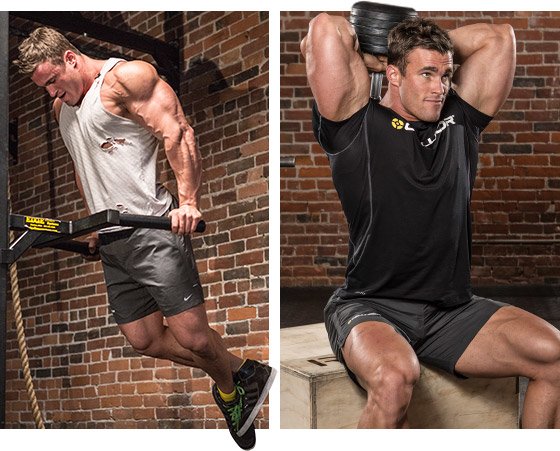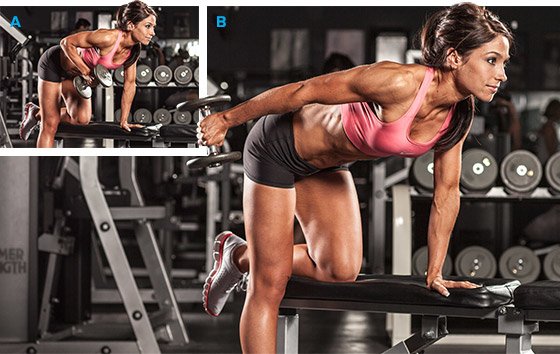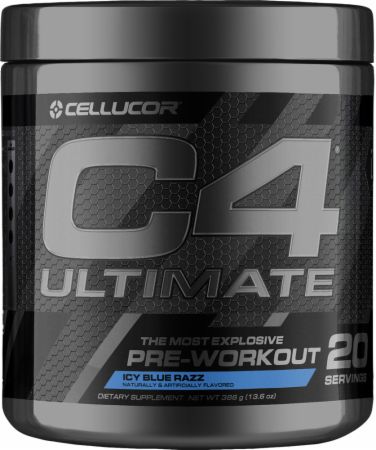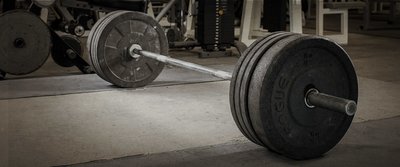There are two approaches you can take in your effort to build bigger triceps. First, there's the "I need to do more and train harder" school of thought, in which more intensity and volume always seem to be the answer for your lagging body parts. This tactic works to a certain extent, but doing more has a point of diminishing—and then negative—returns.
The other school of thought is a bit more cerebral. It requires that you take apart the problem (the small triceps) and attack it from different perspectives—building up each of the three heads individually, as well as together—for maximum size and continued growth.
Since you're probably well-versed in the former approach, let's take a look at the latter. We'll start by dissecting the triceps muscle into its three heads: lateral, medial, and long. While it's less important to know where each is located on your arm, it's critical to know how best to target and emphasize specific heads.
We're going to focus primarily on the triceps long head, which attaches above the shoulder joint, unlike the other two triceps heads. This is important because the long head is stretched only when your arm is raised overhead. For a muscle to undergo a strong contraction, it must be fully stretched first. So when your arms are overhead, that's when you're really targeting the long head.
Check out these 7 strategies to build up your triceps long head and support overall growth!
1. Train Your Triceps Twice Per Week
This is a good place to start, especially with a smaller muscle group like the triceps. As long you don't increase your triceps training frequency for more than 6-8 weeks, training your triceps twice per week can provide a nice stimulus for greater growth. This muscle group recovers fairly quickly, so 2-3 days between workouts is all you need.
That being said, training chest on Mondays, shoulders on Tuesdays, and triceps on Wednesdays does not qualify as 2-3 days rest, because multijoint presses (for both chest and shoulders) all involve elbow extension, meaning your tris are getting worked on back-to-back-to-back days. Keep this in mind when setting up your split.

Training tris twice per week also means not doing shoulders or chest the day before or after you train your arms. It doesn't take a rocket scientist to set up your split, but you have to be aware of certain limitations.
One more pointer: If you do train triceps twice per week, make them completely different workouts, so the muscle fibers are stimulated in different ways. You might even make one of those routines a basic overall triceps mass-building routine, and focus the other on just overhead movements.
2. Don't Always Tack On Triceps After Delts Or Chest
No doubt you know how fatigued your triceps are following a good shoulder or chest workout, so one solution to build meatier triceps is to simply train the smaller muscle group immediately after one of the larger push-day workouts. Finish them off, so to speak.
This is a great idea many bodybuilders follow, but you could consider an arms-only day as your second workout. The triceps won't be prefatigued, so you'll be able to hit them with more energy and more weight—a great combination for maximal stimulus.

Tricep kick-backs
3. Choose A Solid Mass-Building Long-Head Move
I'm a firm believer in two things when it comes to working out: First, do multijoint movements early in your workout before single-joint ones, even for a smaller muscle group like the triceps. Second, if you've been training for a while and your progress has stagnated, make subtle changes to your exercises so they're just a bit different from what you normally do in an effort to further muscular growth.
While there are no overhead multijoint triceps exercises that directly target the long head, there's at least one good one in which your arms are perpendicular to your torso: the close-grip bench press, with a slight tweak. Perform the press on a slightly inclined bench in the Smith machine. Here, the long head isn't quite fully stretched, but it gets a bit more stretch than if you used a flat bench, and the angle itself is novel, hitting the muscle in a slightly different way.
Don't be shy about choosing heavy weights with your multijoint triceps exercises. Aim for a weight at which you fail at about 8 reps, keeping the higher-rep sets for the tail end of your workout when you're aiming for a final pump. If you can do 8 reps, add more weight.

4. Prioritize The Long Head
Prioritizing simply means doing your overhead triceps exercises before movements that zero in on the lateral and medial heads, like triceps press-downs or kickbacks.
Because your energy levels start to sag as muscle glycogen stores become depleted and fatigue sets in over the course of your workout, you should do overhead movements early in your training session. Reordering your workout to focus on the long head isn't difficult, and can easily be reorganized for when you'd rather target those other heads.
5. Choose a Second Long-Head Movement
Just because you did one overhead movement doesn't mean those long-head fibers can go on holiday for the rest of your workout. Hit 'em again, in fact, but be sure to pick a movement that uses a slightly different angle and a different relative intensity.
If you did seated overhead EZ-bar extensions as your first long-head movement for sets of 8-10, do one-arm overhead extensions or bent-over rope overhead extensions (pulley positioned at the top) with a weight at which you fail at 10-12 reps.
Adding this second movement from a slightly different angle and with a slightly different relative intensity is the best way to work the long head—or any muscle—for better overall gains.
6. Long-Head Movements
Any triceps exercise with your arms overhead is fair game here, but it should be noted that you'll get more bang for your triceps buck if you keep your arms in tight as you complete the movements. Consider the overhead dumbbell extension (one dumbbell using both arms). It's especially tough for bigger guys to do this movement without their elbows flaring out—way out. By taking a slightly wider grip using an EZ-bar, it might be a bit easier to keep your elbows in tight.

EZ-Bar Overhead Extensions
You can do overhead movements with a dumbbell (I prefer the bilateral dumbbell version since you can't use much weight—in fact, well less than half—on the single-arm version), EZ-bar, or even a rope attached to a lower cable. You can even move the cable to the top position and bend over, facing away from the cable, to do rope extensions. There are also some machines on which you can do overhead extensions.
And don't forget about including close-grip bench presses with the bench slightly inclined. As with this particular variation, look for other ways to introduce slight modifications to add variety to your overhead triceps exercise arsenal.
7. Don't Stop At Failure
When you're looking to add size, a key component is taking your working sets to muscle failure—the point at which you can't do any more reps with good form. (If you choose a weight at which you can hit failure between 8-12 reps, you know your stuff, but that's another article.) Taking 1-2 sets of each exercise past failure ensures the muscle has to work even harder—a goal many lifters measure by next-day muscle soreness.
What are some of the best intensity boosters for triceps? Here are a few:
- Forced reps: On your heavy sets of close-grip benches or overhead extensions, have a workout partner help you do a few extra reps with a little push past your sticking point. If you do one-arm overhead movements, don't be shy about using your free hand to self-spot, as well.
- Dropsets: Instead of ending your set at muscle failure, quickly reduce the weight by about 25 percent and immediately resume the set, working toward a second point of muscle failure. Dropsets are especially good with cable movements since changing the weight is as easy as removing and reinserting the pin.
- Peak-Contraction Training: Instead of immediately dropping the weight when you reach full extension, consciously hold and squeeze your triceps for a full count before lowering the weight. As you get more fatigued you can shorten the length of the hold, but this is a great way to increase the potency of each set.
If you want great long-head development, raise your arms. That's what we thought: Everyone wants bigger triceps! Drop your own suggestions and tips in the comments section below.



